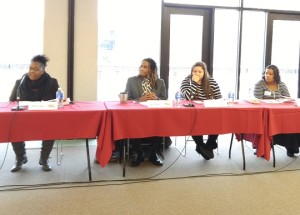Students, faculty participate in first Black Lives Matter conference
SIUE students, faculty and local community members convened at the Morris University Center on Jan. 20 to discuss polarizing and controversial topics for SIUE’s first Black Lives Matter Conference.

Senior psychology major Melvina Chaney speaks on the student panel during the Black Lives matter conference Jan. 20 at the Morris University Center. (Photo by Joseph Lacdan)
The conference was held to create continuous dialogue on the Black Lives movement about social inequality and encourage students to become more active against social injustice. But the conference also provided a platform for understanding about the Black Lives Matter movement and to create more opportunities for dialogue about race issues. Titled “Black Lives Matter: Inside the Movement” the event was also created to further encourage the Black Lives Matter movement on campus.
“Many still question where the movement is headed,” said Dr. Jessica Harris, SIUE history professor. “Can it be sustained? How will it continue to frame its goals? What kind of structures will house it? What happens next? I would say that depends largely on choices the movement makes going forward, as well as a number of external factors.”
Plans for the conference started after Dr. Venessa Brown, associate chancellor of the Office of Institutional Diversity began having conversations with former SIUE Chancellor Julie Furst-Bowe about the events of Ferguson and the shooting of black teenager Michael Brown by a white police officer. Brown notes that the movement started with the shooting death of Florida teen Trayvon Martin in 2012 and that the Black Lives moment did not take the national spotlight until the Michael Brown incident in Ferguson, where the black teen was fatally shot by white police officer Darren Wilson in August 2014.
“We thought it would be good idea that this was a teaching moment – an educational moment,” Brown said. “We thought let’s start a conference that would give an opportunity to start a dialogue about what is some of the misconceptions about it. People don’t really understand what is the Black Lives movement, how it got started, what was the purpose of it.”
Students and members of the community were invited to attend the conference. SIUE students who participated in a student panel shared their personal stories on race, growing up in different communities and some of the social pressures and difficulties African Americans face. Students discussed holding government officials accountable for injustices in the criminal justice system. The students acknowledge that the conference was a step in the right direction, but more must be done. Junior Applied Communications major Gary Pritchett said that more black professors and academic programs for black students will help increase African American enrollment at SIUE. Pritchett said more education can help improve race relations. The student panel was comprised of several CAS students including Applied Communications major D’Amonti Batton-Jackson, Political Science major Dillon Santoni, Art Therapy graduate student Veronica Delgado and Theater major Ashley Dozier. One student said her brother was currently incarcerated and she had to live under the shadow of her brother’s criminal past.
The students also responded to opposition and criticism of the Black Lives Matter movement.
“Of course all lives matter, but the crisis right now in our country is the issue of black lives and how it’s being taken for granted,” said senior Theater major Ashley Dozier. “And young black men and young black women’s lives are being thrown away so carelessly, that’s why my perspective matters, my belief matters and hopefully my life matters.”
Social Work professor Kim Carter, SIUE director of Black Studies Prince Wells and Historical Studies professor Bryan Jack participated on the faculty and community panel. Edwardsville NAACP president John Cunningham, Kalisha Turner from the Academic advising office and SIUE University police Chief Kevin Schmoll rounded out the panel.
Brown said the goal of the movement was to encourage SIUE students to become actively involved in movements against social injustice and create new channels of communication. The conference also featured a photography exhibit by Mass Communications major Christian Lee, featuring a collection of photos from the Ferguson protests titled “Ferguson Unrest.” Jack pointed to a deeper problem when it comes to the civil rights struggles of African Americans. Jack and Professor Rowena McClinton led a group of SIUE students on a tour of historical sites significant to the civil rights movement last spring.
“The rights of African American citizens have never seemed important in the United States. It’s ugly to say, it’s ugly to hear but it’s true,” Jack said. “If we go back, the approximately 5,000 African Americans who were lynched in between 1880-1930 with the federal government and no one else doing anything about it. The reserved segregation under Jim Crow … the response to Hurricane Katrina, people drinking poisonous water in Flint, Michigan right now. When you compare the response to the crack epidemic of the 1980s in terms of locking up black people to the heroin epidemic of the suburbs lately … the rights of African American citizens have never been important to this country in many ways.”
Filed Under: African Studies • Historical Studies • Mass Communications • Political Science • Public Admin & Policy • Social Work • Speech Communication












